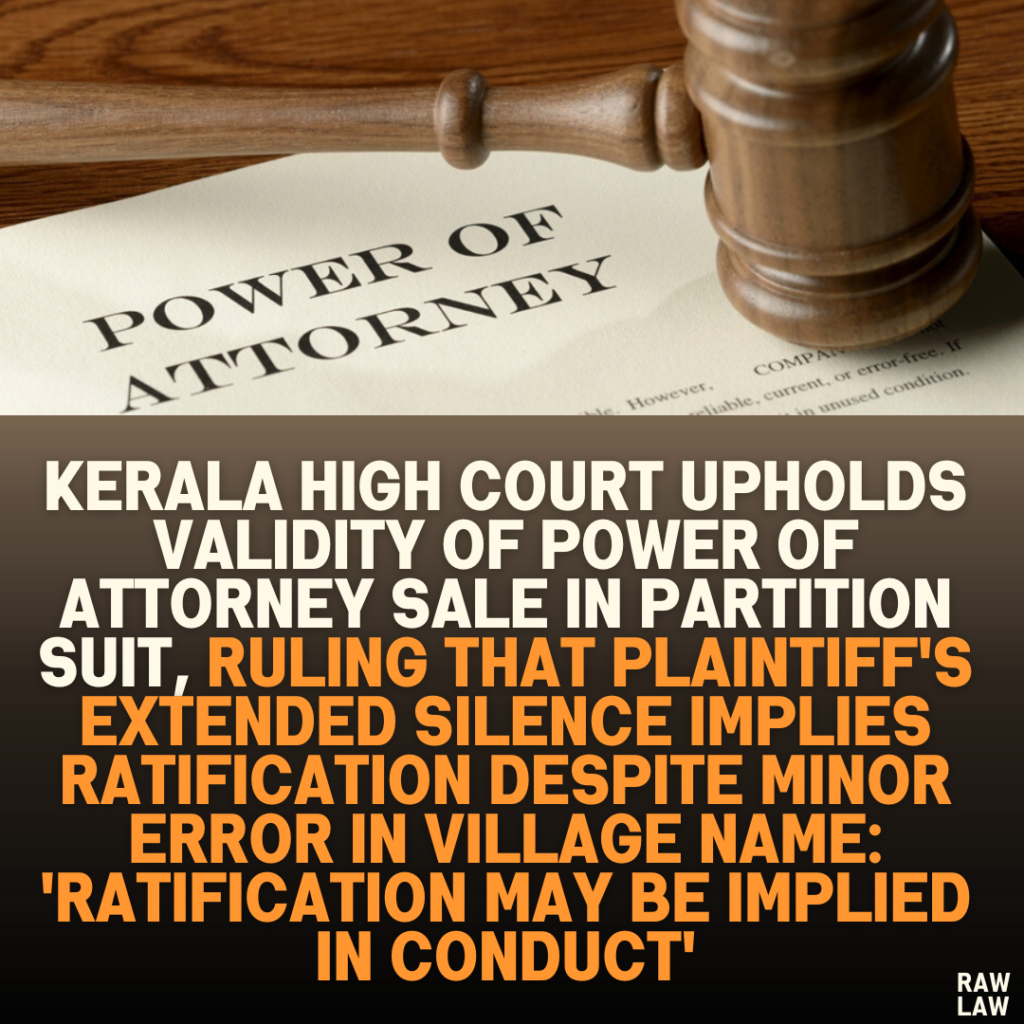Court’s Decision
The Kerala High Court dismissed the appeal and upheld the dismissal of the partition suit filed by the appellant, affirming that the sale deed executed by the first defendant as the Power of Attorney holder was validly ratified by the appellant and co-defendants through their long silence. The court held that this ratification, even if implied by conduct, allowed the sale to stand, especially given the extended period without objection from the plaintiffs. The court also found no requirement for a rectification of the power of attorney, despite a minor error in village identification.
Facts
The plaintiff initiated a suit for partition, seeking a one-fifth share in a 3.02-acre property initially owned by their father, who passed away in 1990. The plaintiff claimed that the first defendant, who held the power of attorney for the family members, had improperly sold this property to a third party without legal authority, as the power of attorney excluded the village name where the property was situated. The supporting defendants aligned with the plaintiff’s claim for partition.
The first defendant, however, executed the sale on behalf of the plaintiff and two co-defendants under the power of attorney, which listed properties in a nearby village but omitted the correct village name for the property at issue. The defendants argued that the omission was a clerical error and that the plaintiffs had effectively ratified the sale by not raising objections for over 15 years.
Issues
- Whether the omission of the correct village name in the power of attorney rendered the sale deed void.
- Whether the prolonged silence of the plaintiff and supporting defendants implied ratification of the sale deed.
- Whether the First Appellate Court exceeded its jurisdiction in overturning the trial court’s judgment.
Petitioner’s Arguments
The appellant argued that the power of attorney explicitly excluded the property in question, as it listed a different village, thereby invalidating the sale deed. They contended that such an omission could not be rectified merely by ratification inferred through silence, especially since the sale deed was void.
Respondent’s Arguments
The respondents maintained that the village name was mistakenly listed in the power of attorney due to the shared administrative structure between the villages. They argued that the plaintiff’s silence and failure to challenge the sale for over 15 years constituted an implied ratification of the sale, thus validating the transaction.
Analysis of the Law
The court analyzed relevant provisions of the Indian Contract Act, particularly Sections 197-200, addressing ratification through implied conduct, and Section 115 of the Evidence Act, covering estoppel. The court reasoned that when a party remains silent regarding a transaction it is aware of, ratification can be inferred if no reasonable explanation for the silence is provided.
Precedent Analysis
The court relied on precedents emphasizing that ratification could occur through implied conduct and silence over a prolonged period. The court also cited cases stressing the strict construction of power of attorney documents but noted that the specific context and prolonged inaction by the plaintiffs outweighed a strict textual interpretation of the power of attorney.
Court’s Reasoning
The court concluded that the extended inaction by the plaintiff and the supporting defendants implied their acceptance of the sale, effectively ratifying the transaction. It held that the omission of the correct village name was a mutual mistake and that the parties’ conduct over the years supported an implied ratification. The court also dismissed concerns about the compliance with the Registration Act, as the sale was conducted in the presence of the plaintiff, who did not object at the time.
Conclusion
The court dismissed the appeal, upholding the validity of the sale deed executed by the first defendant. The judgment confirmed that the appellants’ long silence constituted ratification of the power of attorney’s authority to sell, effectively estopping them from challenging the sale deed.
Implications
This ruling underscores the significance of conduct in legal transactions, where prolonged silence on a known issue may amount to ratification. It clarifies that courts may infer acceptance of a transaction from the lack of timely objections, highlighting the potential binding effect of implied ratification on family partition suits.




Pingback: "Madras High Court Dismisses Guarantor's Petition, Upholds Salary Attachment in Chit Fund Recovery; Execution Court Acted Within Jurisdiction, Petitioner Advised to Deposit Amount for Relief" - Raw Law